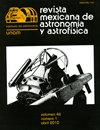聆听您的数据的力量:打开大门和增强发现使用声音
IF 1.7
4区 物理与天体物理
Q3 ASTRONOMY & ASTROPHYSICS
Revista Mexicana de Astronomia y Astrofisica
Pub Date : 2022-08-01
DOI:10.22201/ia.14052059p.2022.54.01
引用次数: 1
摘要
作为一名盲人研究员,我完全依靠声音来分析我的数据和执行我的研究计划。为此,我积极参与一项合作,探索数据超声(将数据转换为声音)的使用,以增强、验证和加速发现。我们项目的范围并不局限于使盲人和视障研究人员能够为以前无法进入的研究领域做出贡献。相反,我们也期待使用新的多模态方法,利用声音的特性来应对现代天体物理学趋势所带来的主流挑战。使用“现实生活”的例子,我描述了我们如何探索时间序列数据、光谱和多维数据集,这些数据集映射到各种声音特征,如音高、幅度、波形、脉冲重复率、音质、失真和噪声,以提供有关测量不确定性的附加信息。我讨论了数据超声在高红移星系研究中的应用,以及在我们的协调多波长观测计划中探测和跟踪快速瞬变事件的应用。最后,我概述了当前的研究方向,包括触摸屏和触控板方法,以检查散点图(非线性)数据表示,基于形状的识别,以及使用组合加权谐波将多维数据集中的信息内容呈现为声音。本文章由计算机程序翻译,如有差异,请以英文原文为准。
THE POWER OF LISTENING TO YOUR DATA: OPENING DOORS AND ENHANCING DISCOVERY USING SONIFICATION
As a blind researcher, I rely entirely on sound to analyse my data and carry out my research program. To this end I am active in a collaboration that is exploring the use of data sonification (converting data into sound) to enhance, validate, and accelerate discovery. The scope of our program is not limited to enabling blind and visually-impaired researchers to contribute to areas of research that were not previously accessible. Rather, we look also to the use of new multi-modal approaches that exploit the properties of sound to address mainstream challenges presented by trends in modern astrophysics. Using ‘real-life’ examples, I describe how we are ex- ploring time-series data, spectra, and multi-dimensional datasets mapped to a variety of sonic characteristics such as pitch, amplitude, waveform, pulse repeat rate, tone quality, and distortion and noise to provide addi- tional information on measurement uncertainties. I discuss the application of data sonification to high redshift galaxy research and to our coordinated multi-wavelength observational program to detect and follow up fast transient events. Finally, I outline current research directions involving touch screen and trackpad approaches to examine scatter-plot (non-linear) data representations, shape-based recognition, and the use of combined weighted harmonics to render the information content in multi-dimensional datasets as sound.
求助全文
通过发布文献求助,成功后即可免费获取论文全文。
去求助
来源期刊

Revista Mexicana de Astronomia y Astrofisica
地学天文-天文与天体物理
CiteScore
1.30
自引率
10.00%
发文量
14
审稿时长
>12 weeks
期刊介绍:
The Revista Mexicana de Astronomía y Astrofísica, founded in 1974, publishes original research papers in all branches of astronomy, astrophysics and closely related fields. Two numbers per year are issued and are distributed free of charge to all institutions engaged in the fields covered by the RMxAA.
 求助内容:
求助内容: 应助结果提醒方式:
应助结果提醒方式:


